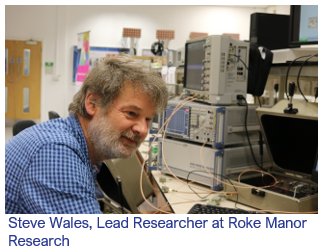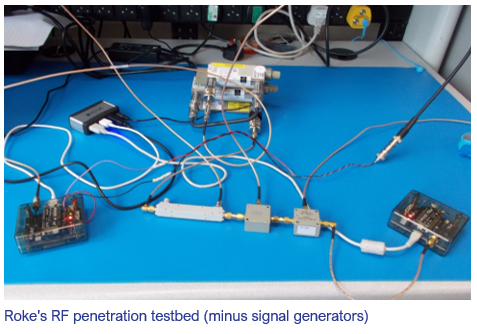EPSRC Prosperity Partnership projects aim to tackle problems of national importance through co-creation and innovation between academia and industry. As a partnership project, SWAN’s research programme is enriched by the knowledge and expertise of our industrial partners.
 In the next of our ‘spotlight’ research blogs, we spoke to Steve Wales, Lead Researcher at Roke Manor Research, about his contributions to SWAN. Steve leads much of the work done by Roke on SWAN’s RF penetration testbed, examining methods of jamming detection and investigating efficient jamming techniques.
In the next of our ‘spotlight’ research blogs, we spoke to Steve Wales, Lead Researcher at Roke Manor Research, about his contributions to SWAN. Steve leads much of the work done by Roke on SWAN’s RF penetration testbed, examining methods of jamming detection and investigating efficient jamming techniques.
Can you tell us a little bit about your own research interests and background?
I have been working in industrial research and development for nearly 40 years, with a main research focus on wireless communications, dating back as far as before GSM came into existence. Since then my work has covered all generations of mobile wireless systems, plus satcom. My current focus over the past 10 years has been largely in wireless communications for defence.
How does the SWAN programme of work fit into both your own and your company’s research priorities?
SWAN is about RF cyber in the commercial world, and Roke’s defence interests cover RF cyber in the defence world, so there is a considerable overlap. My recent own research has covered RF attack on commercial wireless standards, and also developing waveforms for defence applications.
Can you give us a brief overview of the work packages you have been involved with so far as part of the SWAN project?
I’ve mostly contributed to the White Paper on RF Vulnerabilities and the RF Penetration Test Bed, but also leading some of the work done by Roke that has examined methods for detecting jamming in LTE and some investigations into efficient jamming techniques.
Where does this work fit in with SWAN’s wider Research Challenges?
Assessing the vulnerabilities of commercial wireless devices to jamming and other forms of RF cyber attack is one of the main research challenges for the SWAN project. Developing methods for detecting jamming, with minimal impact on commercial wireless devices, forms another one of SWAN’s research challenges.
What will be the next steps and key outputs for the work packages you have been involved with?
The next step for the RF Penetration Testbed is to look at mitigation techniques against some of the jamming waveforms that have been tested so far.
What in your opinion are the key benefits of industry and academia working so closely together?
My experience of industrial research and development is that it tends to be very focused on specific issues, either product focused or, in Roke’s case, problems posed by customers. This means that research is more focussed on the near-term. Academic research has more freedom and can allow problems to be explored in greater depth, which can be of great benefit to industrial research. In turn, academic researchers can benefit from the experience and different perspectives of industrial researchers.
Can you tell us of one recent publication in the world of communications systems and networks research that has interested you?
The application of machine learning to wireless communications has become quite popular recently. Perhaps one of the most interesting publications in this area is Tim O’Sheas paper on “An Introduction to Deep Learning for the Physical Layer” published in IEEE Transaction on Cognitive Communications and Networking, 2017.
SWAN Prosperity Partnership
SWAN is an EPSRC Prosperity Partnership project dedicated to the creation of Secure Wireless Agile Networks (SWAN) that are resilient to both cyber attacks and accidental or induced failures. The partnership is made up of contributors from the Smart Internet Lab at the University of Bristol, Toshiba Research Europe Ltd, GCHQ, and Roke Manor Research Ltd.
Interested in reading more about SWAN and our programme of research? Take a look at our website for more information or sign up to our newsletter for regular updates on SWAN activities and opportunities to get involved.

